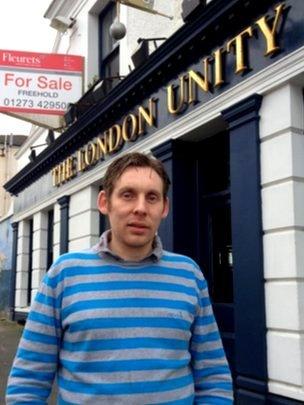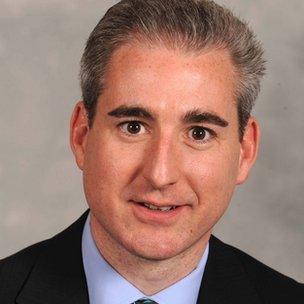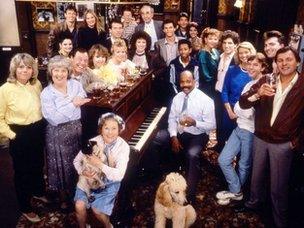Can politicians save Britain's pubs?
- Published
- comments
Thousands of publicans are struggling to make a living, with the smoking ban, high beer tax and "unfair" prices charged by pub companies being blamed. The government has promised to act, but will it do enough?

Alan Leach is giving up being a publican after little more than two years
For millions of people it is "the dream".
Running a pub - what could be better? Chatting to customers, being a leading figure in the community, being bought the odd drink, having fun: it certainly beats the nine-to-five, and the money's not bad, either.
That is the idealised vision of the licensed trade. For many thousands of publicans, the reality is very different.
Pubs, some of them hundreds of years old, are closing at the rate of 18 a week across the UK, according to the Campaign for Real Ale, external.
The smoking ban and rises in VAT and beer duty have hit profits, not to mention recent recessions and cut-price booze deals in supermarkets.
Many of those running pubs are locked into exclusivity deals, under which they are known as "tied houses". This means they can only sell beer, wine and spirits supplied by the companies owning the premises.
'Getting worse'
Often the wholesale prices are so high they squeeze any chance of making a decent living, it is argued.
Alan Leach is one of the growing ranks of the disillusioned.
He has run the London Unity, in the trendy Hanover district of Brighton, for two years. Given the hilly surroundings, its residents should be thirstier than most.
But Mr Leach, who used to work as a manager for a medium-sized Brighton pub firm, has struggled since taking over his own premises.
He has attempted to diversify to encourage more custom, serving curries and Sunday roasts, but has found it hard.
His lease ends soon and he is not renewing it. The pub, which dates back to the mid-19th Century, has been put up for sale by Enterprise Inns, external, which owns the building's freehold.

Greg Mulholland has pushed for more regulation of pub companies
Mr Leach told the BBC News website: "It's becoming really difficult for publicans. The companies are charging too much for the beer, hitting our profit margins.
"Also, the rise in VAT and the smoking ban are putting the squeeze on us. Things are only getting worse and something has to be done about it.
"Otherwise, independent pubs like ours are going to keep closing, and communities will suffer."
The London Unity is being advertised as premises which would "suit alternative uses subject to planning", one of which could be as flats.
A Twitter campaign , externalhas been established to prevent this happening, led by Rhian Jones, a restaurateur who wants to take over the pub and keep it as a licensed premises.
She said: "It's a nice-sized pub and it's in a nice area, with an established customer base. People agree with me that it would be a pity if the London Unity closed.
"Every day I drive past signs saying pubs have closed down and there's permission to turn them into housing. It's so sad. I want to run the Unity as a good old-fashioned pub."
But Enterprise Inns denies it is pushing for the London Unity to become housing in an effort to make a quick buck.
'Scam'
A spokesman said: "As part of our ongoing business, we do from time to time identify a pub which is unable to deliver an appropriate level of sustainable income.
"After careful consideration and a review of all options, the decision has been made to offer the freehold for sale on the open market with no restrictions on future use."
Pubs have changed enormously over the past couple of decades. Most offer food. Some are far swisher. Opening hours are longer.

Pubs have an established place in British life
But the biggest change came after the Conservative government of the late 1980s became concerned that large breweries owned too many pubs.
The Monopolies and Mergers Commission found they were creating a "complex monopoly", damaging the interests of publicans and customers.
The resulting "Beer Orders" stipulated that no brewery was allowed to have more than 2,000 tied houses by November 1992.
So thousands of pubs were sold, many of them bought by companies which became known as "pubcos", which, as they did not manufacture drinks themselves, were exempt from the terms of the Beer Orders.
They quickly proliferated and the largest today are Enterprise and Punch Taverns, owning more than 8,000 pubs and bars each.
Liberal Democrat MP Greg Mulholland, who chairs the All-Party Save the Pub Group, has accused pubcos of overcharging for beer and rent to help pay off their large debts.
He said: "The anti-monopolies move went wrong. The pubcos are now as big as the breweries ever were. Politicians on all sides recognise that something needs to be done. A lot of what is going on is nothing more than a scam.
"These firms are in debt and the quickest way to get rid of it is to sell off the premises. That means a load of pubs will end up as housing or supermarkets, ripping the heart out of many communities.
"It's heartbreaking. People are just trying to make a decent living and do their bit to keep places alive."
'Irresponsibly low prices'
Amid accusations that pubcos are exploiting tenants, the current government has promised to introduce a statutory code of practice to govern the relationship between them and landlords, overseen by an independent regulator.
The details of this arrangement still have to be thrashed out.
But Enterprise Inns said the tied house model was working for thousands of publicans, offering a "low cost of entry", as buying a lease was far cheaper than having to purchase the building outright.
Chief executive Ted Tuppen argues that politicians are to blame for much of the malaise, particularly the beer duty escalator, which automatically rises at 2% above the rate of inflation.
He said: "The past five years have clearly been difficult for publicans, with the smoking ban and irresponsibly low prices from supermarkets.
"In addition, the impact of the duty escalator has greatly contributed to the demise of many smaller, wet-led [beer, rather than food-oriented] pubs. During the past three years, whilst our average profit per pub has declined 12% to £67,000 per annum, the Treasury has increased its tax take by 19% to £145,000 per pub."
Action on tied houses is being promised, but it is too late for some. For others, a more fundamental rethink of taxation is just as important.
Behind the bar at the London Unity, Alan Leach is preparing to pack it all in in a few weeks' time. "It's such a pity, but I've got to make a living," he said.